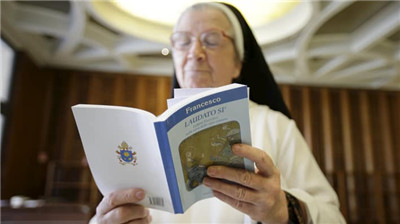(单词翻译:单击)
The shocking thing about the papal encyclical Laudate Si is not that it was leaked in advance nor even that it embraces the idea that most emissions of greenhouse gases are the result of human activity. The thing that should shock readers is its attack on science and technology — the very tools, indeed the only tools, which offer a solution to climate change.
对于教皇方济各发表的题为《赞美你》(Laudato Si)的通谕,令人震惊之处不在于它被提前泄露,甚至也不在于它支持的观点,即大部分温室气体排放是人类活动的结果。应当让读者震惊的是它对科学技术的攻击,而科技恰恰是为气候变化提供解决方案的工具(其实也是唯一工具)。(上图为一名修女在梵蒂冈阅读教皇方济各的《赞美你》(Laudato Si)通谕)

I am not a student of theology and therefore do not claim to understand the subtleties of the Catholic Church’s teaching on science. But since the Pope has moved outside his own natural territory and into energy policy, some response seems appropriate.
我并非一名学习神学的学生,因此不能宣称理解天主教会科学教义的细枝末节。但是,既然教皇超出了自己的领地,涉足能源政策领域,我们做出一些反应似乎是合适的。
From a distance, Pope Francis seems to embody decency. He is modest, frugal, concerned for the poor and hostile to the creepier side of the church hierarchy in Rome and beyond. That makes him stand out in a world of shallow and cynical “leaders”. He commands millions of followers and his words deserve to be taken seriously whether one is a Catholic or not.
从远处看,教皇方济各似乎是正派的化身。他谦逊、节俭、关心贫苦大众,而且反对罗马和其他地区教会系统的阴暗面。这使他在当今世界浅薄而犬儒主义的“领导人”里脱颖而出。他号令着数以百万计的追随者,不论你是不是天主教徒,他的话都值得认真思考。
But if you read the encyclical there is a flaw in the argument that undermines the credibility of the whole text. It is perhaps best summed up by paragraph 110 of the document, which deserves to be quoted in full:
但如果你通读这则教皇通谕,就会发现其论据有一个瑕疵损害了整个文本的可信度。文中第110段也许最透彻地反映了这一点,在这里值得被全段引用:
“It can be said that many problems of today’s world stem from the tendency, at times unconscious, to make the method and aims of science and technology an epistemological paradigm which shapes the lives of individuals and the workings of society. The effects of imposing this model on reality as a whole, human and social, are seen in the deterioration of the environment, but this is just one sign of a reductionism which affects every aspect of human and social life. We have to accept that technological products are not neutral, for they create a framework which ends up conditioning lifestyles and shaping social possibilities along the lines dictated by the interests of certain powerful groups. Decisions which may seem purely instrumental are in reality decisions about the kind of society we want to build.”
“可以说,当今世界的许多问题源于(经常是无意识的)这样一种倾向,即让科学技术的方法和目标成为塑造个人生活和社会运作的认识论范式。对人类和社会现实整体实施这种模式,造成的影响表现在环境恶化上,但这只是影响人类和社会生活方方面面的简化论的一个标志。我们必须承认,科技产品不是中性的,因为它们创建了一个框架,最终根据某些强大集团的利益来影响生活方式,塑造社会可能性。那些貌似纯属工具性的决定,实际上决定了我们要构建什么样的社会。”
This is one among many examples of a critique of science that runs through the whole document. This must be disspiriting, to put it mildly, to the many Catholics who have been involved in research on climate change over the last 20 years and more. The very problem of climate change was identified by scientific analysis. The Intergovernmental Panel on Climate Change, the IPCC, is composed of scientists whose conclusion about the causation of climate change and the associated risks if it continues unchecked have brought the issue to public attention across the world. Those scientists did not rely on prayer but on hard work, often extending the limits of what was previously known. Their work is what separates them from the deniers of climate change whose belief is based on faith rather than facts.
这是贯穿整篇通谕的批判科学的许多例证之一。这一定会让(说得婉转些)许多在过去20多年里参与研究气候变化的天主教徒感到沮丧。气候变化这个问题只能通过科学分析确定。联合国政府间气候变化委员会(IPCC)是由科学家们组成的,他们得出的关于气候变化因果关系及相关风险(如果再不控制)的结论,引起了全世界公众对这一课题的关注。这些科学家依靠的不是祈祷,而是严谨细致的工作,往往拓展原有知识的极限。他们的工作把他们与那些否认气候变化的人区分开来,后者的信念建立在信仰(而非事实)的基础上。
Having identified the problem, what are the solutions? There is no single answer. Pope Francis repeatedly calls for a change in behaviour. That is all well and good but for many people, especially the world’s poorest, such a behavioural change can only happen if they are offered a viable alternative to burning coal or other fossil fuels. Every possible alternative I can think of comes back to science — either in the form of existing technology or scientific advances that have yet to be made. That includes electric vehicles which would reduce oil consumption, smart meters which would control and limit energy use, carbon capture and storage, clean coal technology, advanced batteries and other storage technologies, photovoltaics and advanced materials. The list could go on — and indeed fills up hundreds of pages of the latest review of Energy Technology Perspectives from the International Energy Agency.
找出问题之后,解决方案是什么呢?答案不是唯一的。教皇方济各一再呼吁人类改变自身行为。这当然很好,但对许多人(尤其是世界上最贫穷的人群)来说,只有向他们提供一种替代燃烧煤炭或其他化石燃料的可行方案,才有可能改变他们的行为。我能想到的任何可能的替代方案,都要借助科学——不论是以现有技术的形式,还是依靠尚未成为现实的科技进步。它们包括可以减少石油消费量的电动汽车、控制并限制能源使用的智能电表、碳捕获和储存、洁净煤技术、先进电池和其他存储技术、光伏发电和先进材料。当然还有很多——在国际能源署(IEA)最新发表的《能源技术观察》(Energy Technology Perspectives)中,有几百页的篇幅描述此类技术。
Scientists are advancing these technologies across the world — in companies and in universities by individuals who believe they are doing something good for the world. The encyclical undermines their efforts.
世界各地企业和高校的科学家们都在推进这些技术,他们相信自己正在做对世界有益的事。教皇通谕对他们的努力没有帮助。
If these efforts ceased today I do not know what could take their place. The encyclical implies that climate change is a problem of the rich world consuming too much. One can see why the US. Republicans led by Jeb Bush do not like it. But in reality, the challenge of climate change now is not focused on the US or Europe, where energy demand has stopped growing and where the carbon intensity of GDP declines year by year. The problem comes from the growing populations of south Asia and sub-Saharan Africa — areas that between them will have some 1.5bn to 2bn more citizens in 20 years’ time than they do today. Every citizen needs energy and, although many will subsist on less than they need, tens of millions will become consumers of commercial supplies of coal and oil which will generate more and more emissions. Unless, that is, science can offer a lower-cost alternative.
如果这些努力今天止步,我想不出还有什么可以替代它们。教皇通谕暗示,气候变化是发达国家消费过多的问题。我们可以理解,为什么以杰布•布什(Jeb Bush)为首的美国共和党人士不喜欢它。但实际上,如今气候变化挑战的焦点并不在美国或欧洲,因为美欧的能源需求已停止增长,其国内生产总值(GDP)的碳排放强度也在逐年下降。问题在于南亚以及撒哈拉以南非洲地区的人口增长——这两个地区的人口将在未来20年增加约15亿至20亿。每个公民都需要能源,虽然很多人得不到足够的能源,只能勉强维生,但至少数千万人将成为商业化煤炭和石油供应的消费者,从而导致越来越多的排放——除非科学可以提供一种低成本的替代品。
The Pope calls for a change in behaviour. He is right. But the change should not just come from those who consume too much and who give no care to the environmental impact of their actions. Real change should start with a shift in the mindset of those who remain trapped in the belief that the products of science and technology must always be bad. Knowledge and the ability to apply that knowledge to meet human needs can be positive in every sense.
教皇呼吁人类改变自己的行为。他说的没错。但这种改变不应仅来自那些目前消费过多、而且对自身行为的环境影响毫不关心的人群。真正的改变应当始于另一个人群,这些人必须改变科技产品一定不好的老观念。知识,以及应用知识满足人类需求的能力,无论在什么意义上都是积极的。


